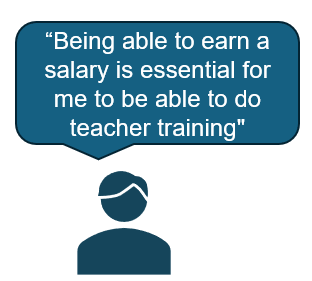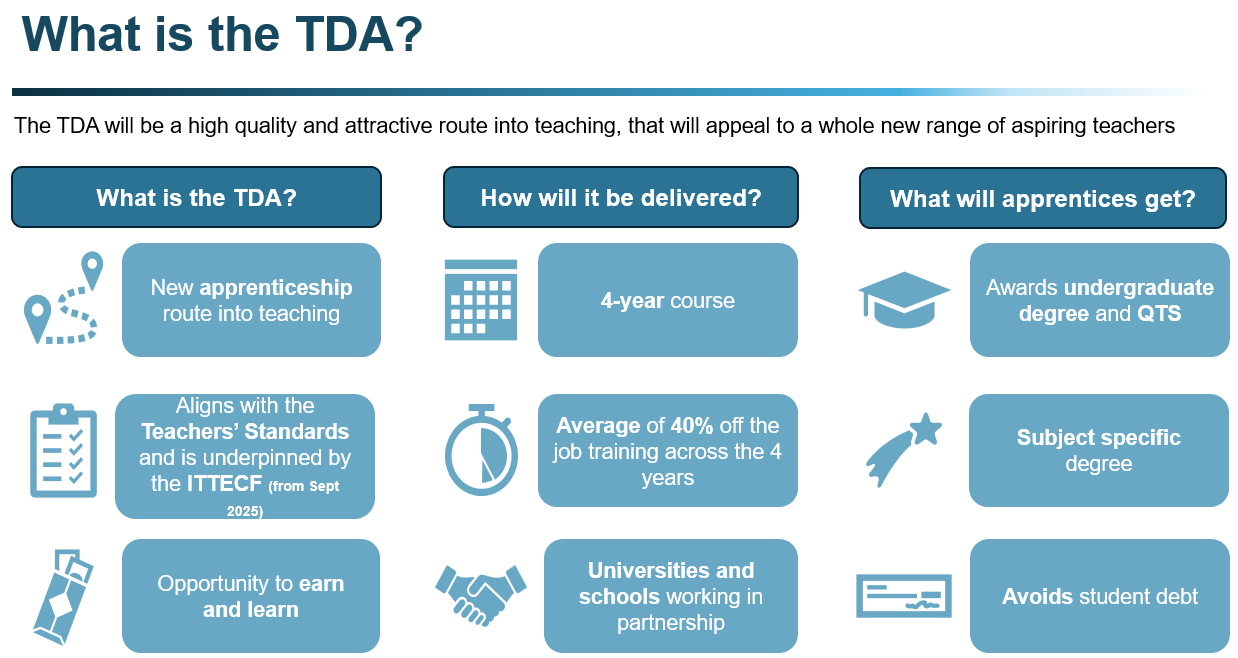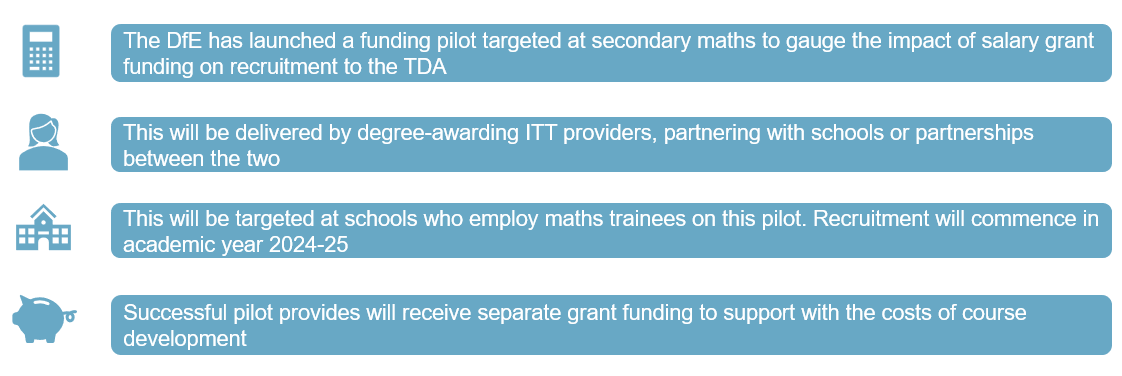- Home
- Train to Teach
- How to become a teacher
- Get a degree while you train
- The Teacher Degree Apprenticeship (TDA)
The Teacher Degree Apprenticeship (TDA)
The TDA is an exciting new apprenticeship route into teaching that provides candidates with the opportunity to earn while they learn.
There has been a gap in the market for an employment-based, degree-awarding route into teaching; the TDA will address this and support the recruitment of excellent teachers. This will broaden access to the teaching profession and allow individuals to train who might otherwise have been unable to.

The TDA will be:
- A 4-year course with an average of 40% off the job training.
- Delivered through ITT providers, working with employing schools on delivery.
- Available for people to train as primary or secondary teachers.
- Available for candidates to apply from Autumn 2024 with training commencing in Autumn 2025.
By completing the TDA, apprentices will receive both an undergraduate degree and qualified teacher status (QTS), whilst receiving a salary and avoiding student debt.

Alongside the wider rollout of the TDA, the DfE has announced a salary funding pilot in secondary maths. The TDA and salary funding pilot will run in parallel and all candidate applications for the TDA & pilot will be launched in Autumn 2024. For all information relating to the TDA pilot, click here.

Further guidance on how schools can work with providers to recruit candidates will be available in due course.
Information is being continuously rolled out so check here regularly for updates.
Frequently Asked Questions (FAQs)
|
Question |
Answer |
|
Is the TDA just in secondary maths?
|
No. The TDA will launch across primary and secondary from this autumn. The scope of subjects will be determined by ITT provider provision. In addition to the full rollout of the TDA, we are running a secondary maths pilot to assess the impact of additional salary grant funding. |
|
Is there funding available? |
Providers will be able to access the apprenticeship levy to cover training and assessment costs for the TDA. The final funding band allowance is due to be confirmed shortly. |
|
Do I need to be on the APAR as an employing school? |
Employing schools that are not delivering any of the off-the-job training do not need to be on the APAR. All providers hosting the TDA (ITT and Universities) need to be on the APAR, For full guidance on Apprenticeship Funding Rules, please visit https://www.gov.uk/guidance/apprenticeship-funding-rules. |
|
How much time will apprentices spend working vs learning? |
All apprentices require a portion of off-the-job learning. Throughout the four-year course, apprentices will likely spend an average of 40% of their time doing off-the-job training, like studying for their degree. The percentage of on-and off-the-job training may vary across training years and different course providers. |
|
Can providers partner to deliver the TDA? |
Similarly to other ITT routes, we welcome partnerships. For further guidance relating to ITT partnerships, please visit. For guidance relating to apprenticeship funding, please visit. Further guidance on TDA partnerships will be published in due course. |
|
How will you ensure that apprentices have the expertise needed to work with children to the same standards of postgraduate teacher trainees? |
Candidates taking part in the TDA will achieve full undergraduate degrees and be awarded QTS in line with all other routes into teaching. |
|
How will pay work, will an undergraduate apprentice be paid the same as a postgraduate trainee teacher? |
We are undertaking work to explore how the TDA salary can reflect the employment duties of TDA trainees at each stage of their course. |
|
How will formative assessment work with the KSBs reflecting the Teachers' Standards? |
The Teacher Degree Apprenticeship will use the Teachers’ Standards for the KSBs. The designed ITT curriculum will incorporate the CCF/ITTECF in full. Providers must fulfil the requirement for ongoing, formative assessment of trainees’ progress in relation to the ITT curriculum. This will ensure that during the course, assessment will identify aspects of the ITT curriculum where trainees may need additional support and input from the provider and can be used to adapt approaches to delivery or reshape trainee practice. TDA progress reviews will enable providers to monitor progress towards the Teachers’ Standards/KSBs. Summative assessment against the Teachers’ Standards/KSBs must take place on completion of all ITT programmes before QTS is recommended, and for apprentices the EPA is completed. We will be working with sector colleagues, including Ofsted, to ensure there is shared clarity about ITT assessment for all ITT courses leading to QTS, including TDA. |
|
Who will mentor candidates? |
From September 2024, as per the ITT criteria and supporting advice, all trainee teachers on ITT courses leading to QTS will be entitled to a minimum of 1.5 hours of mentor support per week during their school placements. Accredited ITT providers must design a 20-hour mentor training curriculum that is closely aligned to their ITT curriculum so that mentors understand the curriculum that they are helping to deliver. |
|
Do you need to be an apprenticeship provider to offer this - who needs it - HEI or SCITT or both? |
All organisations or members of a delivery partnership who offer the TDA must be registered on the apprenticeship provider and assessment register (APAR). Qualified teacher status recommendations can only be made by ITT accredited organisations. |